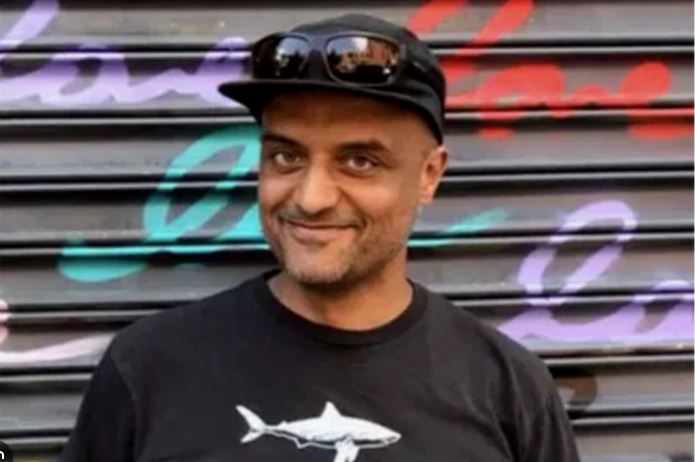BY VEENA RAO
Santa Cruz, CA, November 17, 2025: The October 2019 abduction and murder of tech-and-cannabis entrepreneur Tushar Atre sent shockwaves through his surf-town community. New trial testimony and investigative reports now shed light on both the alleged motives behind the killing and the complex legacy of a man many remembered for ambition, generosity and an adventurous spirit.
A life interrupted
Atre, 50, a New York-born immigrant-child turned Silicon Valley web-agency founder and later cannabis-business owner, was seized from his upscale Pleasure Point home just after midnight on October 1, 2019. Twenty-four hours later his body was found at one of his cultivation properties in the Santa Cruz Mountains.
Friends described Atre as an outdoorsman who loved mountain biking and surfing, and who supported local artists and home-renovation projects in Santa Cruz. His obituary recounted how a bus-truck accident in 1990 nearly cost him his life — an event his family said gave him “a new lease” on living.
The business, the allegations and the trial
At the same time, Atre’s cannabis operation and tech business became the setting for what prosecutors and witnesses describe as a fraught workplace. According to court testimony and press coverage, several former workers alleged that they were subjected to long hours, abrupt changes in pay and humiliating treatment.
According to People magazine, which drew on testimony reported by KRON4, KSBW, CBS News and SF Gate, Kaleb Charters told the jury that he and co-defendant Stephen Lindsay worked for Atre for about ten days in August 2019, laboring “from dawn to dusk” on the cannabis farm for an agreed wage of $200 per day. Charters testified that after the pair briefly misplaced the keys to one of Atre’s farm trucks, the entrepreneur berated them, saying they had wasted his time — time he claimed was worth “a lot of money.” When the keys were eventually found, Atre allegedly threatened to withhold their paychecks and instead ordered the men to perform 500 pushups before he would give them $1,400 — a sum $600 short of what they believed they were owed for the full 10-day period.
People noted that at least one other witness corroborated the push-ups account, and testified that Atre often ran his businesses in ways that employees found humiliating or intimidating. Another employee said there was even a running joke about “robbing” Atre because of how toxic the work environment felt.
Atre’s defenders and many who knew him, however, emphasize a different side: his vision, his willingness to take risks and his personal support of local culture. One of his business associates called him “charisma … infectious.”
Motive and murder
According to the prosecution, the alleged motive for the crime stemmed from a combination of workplace grievances and financial gain. Surveillance video and cell-phone data appear to show the suspects — two of whom had previously worked for Atre — at his property. The case presented by investigators is that Atre was targeted by former workers who felt mistreated, and by a friend associated with them who came armed.
One suspect, Joshua Camps, later reportedly told investigators he shot Atre to end his suffering from stab wounds, calling it a “mercy killing” — a claim prosecutors regard as self-serving.
Sentences and ongoing proceedings
Two of the four men charged in connection with Atre’s killing have now been convicted and sentenced to life without parole. The third, Kaleb Charters, is currently on trial, and the fourth, Joshua Camps, is awaiting his court date.
A nuanced legacy
While recent courtroom testimony has focused heavily on allegations of a harsh workplace culture, friends, colleagues, and former clients have consistently described Tushar Atre in much broader — and often warmer — terms.
A tribute posted on his company’s website shortly after his death remembered him as “clever, creative, and hardworking in every area of his life,” and as someone who found genuine joy in art, nature, craftsmanship, and human connection. Atre was an avid surfer, mountain biker, guitarist, and skilled builder. He supported local artists, integrating their work into his homes and offices, and was known for a personal style that reflected both his playful spirit and his love of expression.
Professionally, Atre had a deep legacy. He founded AtreNet in 1996 with a single client, Mercury Interactive, and spent more than two decades growing it into what the company called “the premiere web services agency for B2B technology companies.” Under his leadership, AtreNet delivered hundreds of major projects and developed signature programs such as Rapid Relaunch, Agile Evolution, and most recently the EPIC scoring system, a tool for benchmarking corporate websites. His team remembered him as a visionary who pushed those around him “to think and act differently — to do better, and always strive for more.”
The tribute emphasized his loyalty to clients, many of whom became close personal friends, and described him as an “indispensable presence” in the company and the broader industry. “He will be missed,” the company wrote, offering condolences to his family and extended community of friends.
What happens next
As Kaleb Charters’ trial proceeds, jurors will weigh whether Atre’s treatment of his workers played a direct role in creating the dangerous circumstances that night, and whether the murder was planned or a robbery gone wrong. Meanwhile, the Santa Cruz community continues to remember a man who seemed to have much left to give. As the investigation now shifts from motive to verdict, the complexity of the case remains.
Photo credit: Legacy.com.



